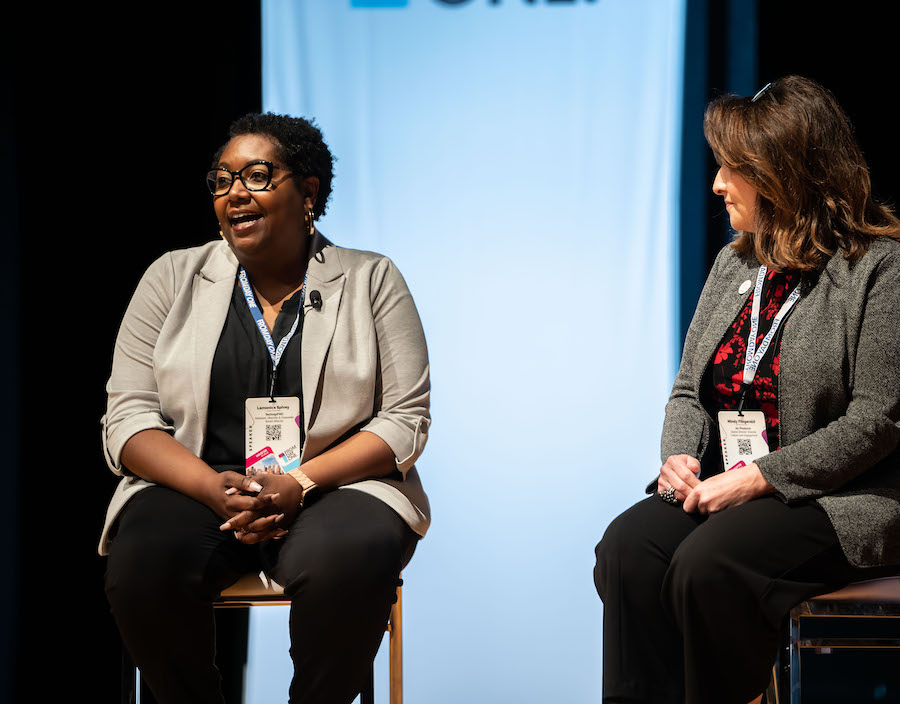Cultivating Renewed Purpose and Community in the Hybrid Era


At the height of the Covid-19 pandemic, workers and employers alike had to respond and adapt quickly to a new normal. They focused on coping, survival, and productivity. Three years later, much of America’s workforce has largely embraced a hybrid model of work. However, many workers have suffered burnout in the aftermath of these changes, resorting to “quiet quitting” while exploring new opportunities that cater to the flexibility they desire.
The third session at From Day One’s Houston conference, a panel moderated by Paul Pavlou, Ph.D., dean and Cullen Distinguished Chair professor, C.T. Bauer College of Business, University of Houston, explored new approaches that employers can take to create a sense of renewed purpose and spirit of community, as well as to support workers who are tired of adapting and yearning for stability.
Early in the session, Rebecca Taylor, the co-founder of SkillCycle, raised the point that any enforced change has to be intentionally planned and well thought out. It also has to promote stability while leaving room for the unexpected.
“The hardest part to remember, even when you're certified in change management, and have done this before, is to leave space for the human experience, and for how every person in the company is going to experience this change,” she said. “As you're navigating change, leaving that room for people is where you have to pay ten times more attention than you thought.”
As the session moved forward, Pavlou touched on how employers can motivate employees in an uncertain and ever-changing environment. While working from home may have seemed like a dream in terms of flexibility in the beginning, some employees found themselves working until late into the night at home, which can obviously contribute to burnout and drive employees away. He highlighted the challenge of motivating employees, particularly when they’re working 100% virtually and not meeting and seeing people face-to-face.
Paula Harris the senior vice president, community affairs, and executive director of the Astros Foundation for the Houston Astros emphasized the importance of flexibility. One “consistent thing, [is the] big need and big desire for flexibility.” In a changing workplace, workers want flexibility and more control over when, where, and how they are working.
On how Air Products is approaching flexible work, Mindy Fitzgerald the the global director of diversity, culture, and engagement, said, “We do have an environment where we do like people to be together,” said Fitzgerald. “But when they come together, they have to have it has to be valuable, and it has to be purposeful. At our company, we instituted something we called the five C's: connection, collaboration, co-creation, celebration, and community. These are really important in building the kind of culture that you need. It's a place to belong, it's a place to connect, it's a place to be known and know others.”
Fitzgerald added that employees’ work, productivity, and performance can greatly inform the level of connection and in-person time that a team requires. Trust is another key element.
“I think we need to learn to trust our people, and our people need to learn to trust the company and the guidance in the direction it gets,” she said.
Pavlou added that organizations also need to prioritize fun, in the sense that employees can get comfortable socializing with each other through activities unrelated to their job responsibilities. Neglecting to highlight this facet has made it harder for employers to recruit for open positions.
“Human beings are not hardwired for stagnation. So, when people say that they're looking for opportunities to learn and grow, it's actually this instinctive drive to embrace challenges and to stay on the lookout for how you're going to navigate your own environment,” Taylor added. “[It’s also] about adaptation. No one likes interviewing when employees leave companies, so if you can save them [from leaving], and show opportunity within their current role, within their current company, and give them what they're craving, then you're going to see more of that retention, and attract more people, too, because people are attracted to companies where people stay.”
Lamonica Spivey, the inclusion, diversity and corporate social responsibility director for TechnipFMC brought up the concept of “cushioning,” a strategy employees use to plan next moves or explore future options.

“It’s so important to hear from your employees on a continuous basis so that you understand what their needs are and what gaps they need to fulfill, because that's potentially your future talent pipeline within your organization,” she said.
Finally, Fitzgerald also highlighted how workers also want honesty and trust, especially when it comes to diversity statistics, investor and stakeholder information, compensation, pay equity, and development opportunities.
“They want companies to be real, not perfect, because they want to make a difference in that real company,” she said.
“[Engage in] active listening. Use your employee resource groups, which create a psychologically safe space for these individuals to prosper, to tell you what's going on in their minds,” Spivey added. “There is no such thing as over-communicating. It's essential today, and we need to continue to cultivate our leaders as well and keep them up-to-date with new generations who are coming into the workplace.”
Emilia Benton is a freelance journalist primarily covering running, health, and fitness, as well as lifestyle, entertainment, and personal finance, among other topics. Her work has appeared in publications such as Runner's World, Women's Running, SELF, Women's Health, and more. Emilia is also a 10-time marathoner and lives in her hometown of Houston with her husband, Omar, and Boston Terrier rescue, Astro.
The From Day One Newsletter is a monthly roundup of articles, features, and editorials on innovative ways for companies to forge stronger relationships with their employees, customers, and communities.